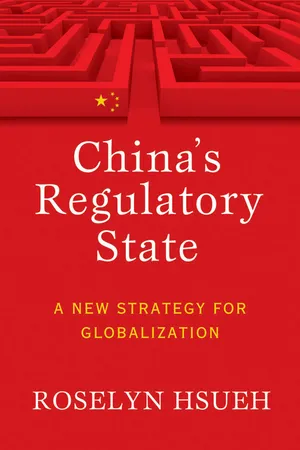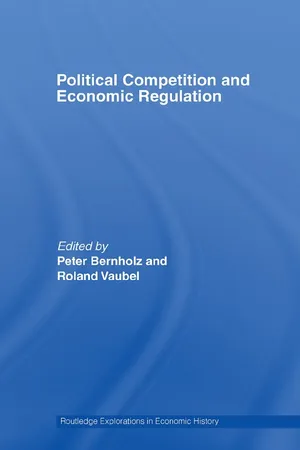Economics
Deregulation of Markets
Deregulation of markets refers to the reduction or removal of government regulations and restrictions on industries and businesses. This is often done to promote competition, increase efficiency, and lower prices for consumers. Deregulation can lead to more innovation and investment in the affected industries, but it can also result in challenges such as market volatility and potential negative impacts on workers and the environment.
Written by Perlego with AI-assistance
Related key terms
2 Key excerpts on "Deregulation of Markets"
- eBook - ePub
China's Regulatory State
A New Strategy for Globalization
- Roselyn Hsueh(Author)
- 2011(Publication Date)
- Cornell University Press(Publisher)
49To adequately capture macro-level liberalization and micro-level reregulation, this study conceptualizes state control to systematically identify state goals , relationship with industry , and methods of control . This conceptualization incorporates ideational (state goals) and institutional (relationship with industry and methods of control) dimensions and differentiates between the central state and the local state in analysis. In the first dimension, state goals reveal whether the central government takes an incidental or deliberate orientation toward market players, the incumbent or the new entrant. Second, the state’s relationship with industry —either the government level and department managing industrial development or the extent of state intervention—reveals whether the central government’s control enhances or undermines its authority over industry. Third, methods of state control reveal whether central government control emphasizes liberalization (introduction of competition) or reregulation (reformulation and creation of rules). Liberalization is defined as policy- and company-level measures that introduce competition and influence and enhance the role of markets. Reregulation is defined as the reformulation of old rules and the creation of new ones to achieve state goals.50 These definitions of regulatory reform imply that liberalization and reregulation are not dichotomous; rather, liberalization entails explicit actions taken by the state, often requiring reregulation, to undermine the role of the state and enhance markets.51 Moreover, as a footnote in the introduction indicates, this book uses “regulate,” “reregulation,” and “regulatory” in the literal sense of the state formulating and creating rules to control industry and does not mean to invoke the developmental state literature’s usage of a regulatory state that only exerts its control as a referee and does not intervene beyond that.52 Measures of state control include rules on or affecting ownership, ownership and business restructuring (such as corporatization and privatization), market entry and exit, and business scope, and technical, production, and service standards.53 State methods are differentiated by primary measures to achieve state goals or corollary measures that facilitate primary ones for functional and political reasons.54 - eBook - ePub
- Peter Bernholz, Roland Vaubel(Authors)
- 2000(Publication Date)
- Routledge(Publisher)
The central question of this study is the regulatory leeway which governments retain in the age of globalization. Our empirical study shows that, first of all, the era of globalization is a period of continuing (and converging) deregulation trends with regard to trade, financial and product markets of high-income industrial countries. At the same time, the econometric evidence shows that globalization in the narrow sense of trade openness and capital mobility has a rather limited impact as an immediate driver of deregulation. This means that national divergence from the global trends of deregulation is not clearly linked to the extent to which an economy is integrated in global capital, goods and services markets. Hence, in a narrow definition, globalization as such leaves substantial leeway for specific regulatory approaches of the nation state. However in a wider sense globalization definitions also comprise the easier flow of knowledge and information across borders resulting in more effective cross-border learning processes. The evidence suggests that these learning aspects of globalization are empirically relevant – at least in fields like product and financial markets. Yardstick competition is important: governments commanding instruments of regulatory redistribution cannot ignore deregulation processes beyond their national borders.The notable exception from these insights is labour market regulation. With regard to job protection regulation and the generosity of unemployment benefits, neither deregulation nor convergence can be detected in the covered period. In addition regulatory trends in the labour markets can be explained only poorly by the logic of convergence or cross-border learning. At the same time, government ideologies have a relatively large impact. Furthermore, there is some evidence that labour market regulation increases with more trade openness. These findings do not allow us to discriminate between Rodrik’s compensation hypothesis and Vaubel’s alternative explanation: voters may demand higher levels of job protection and unemployment benefits because more structural change and job market turnover are the necessary outcome of globalization (Rodrik’s view) or because globalization increases structural unemployment in countries with inflexible labour markets (Vaubel’s view).
Learn about this page
Index pages curate the most relevant extracts from our library of academic textbooks. They’ve been created using an in-house natural language model (NLM), each adding context and meaning to key research topics.

